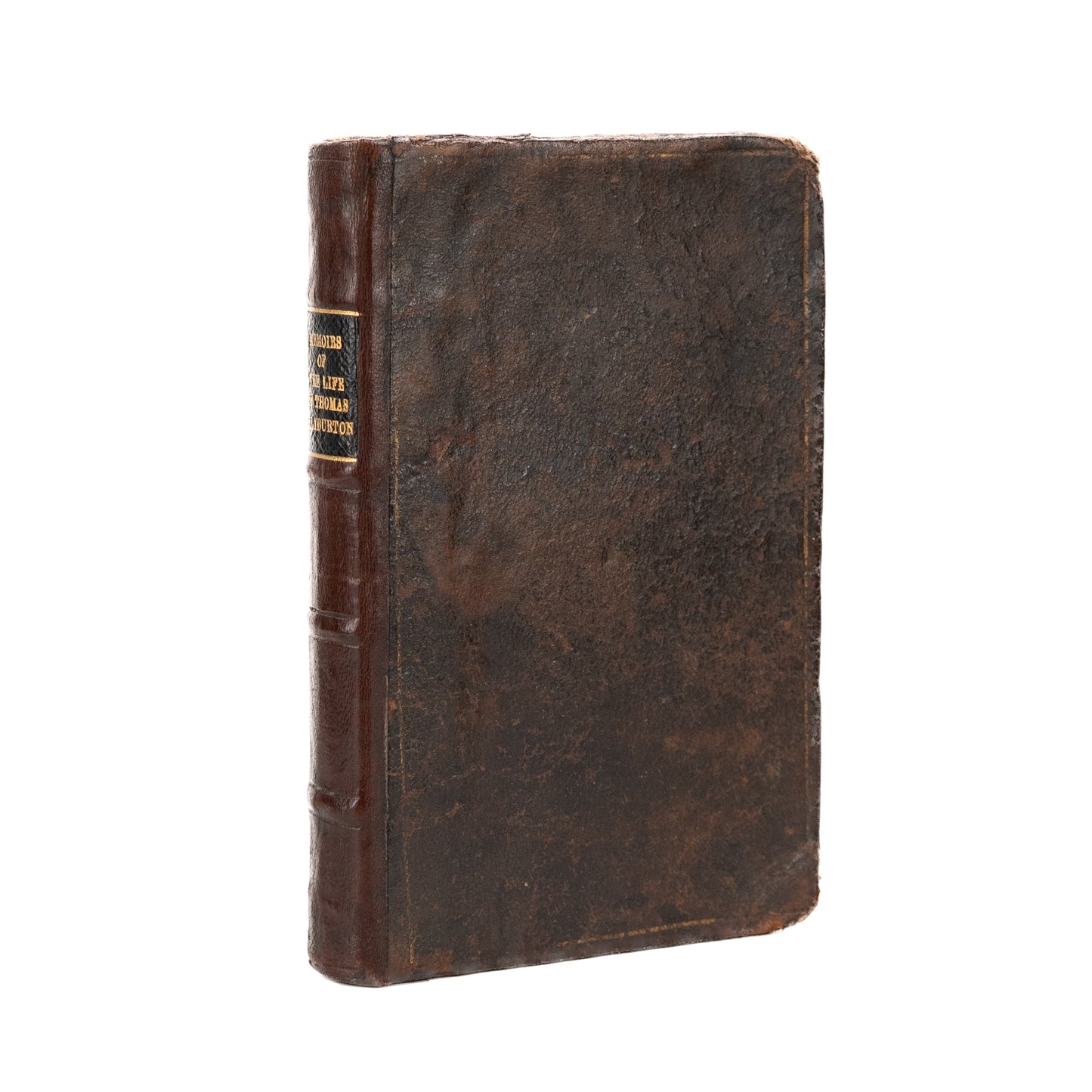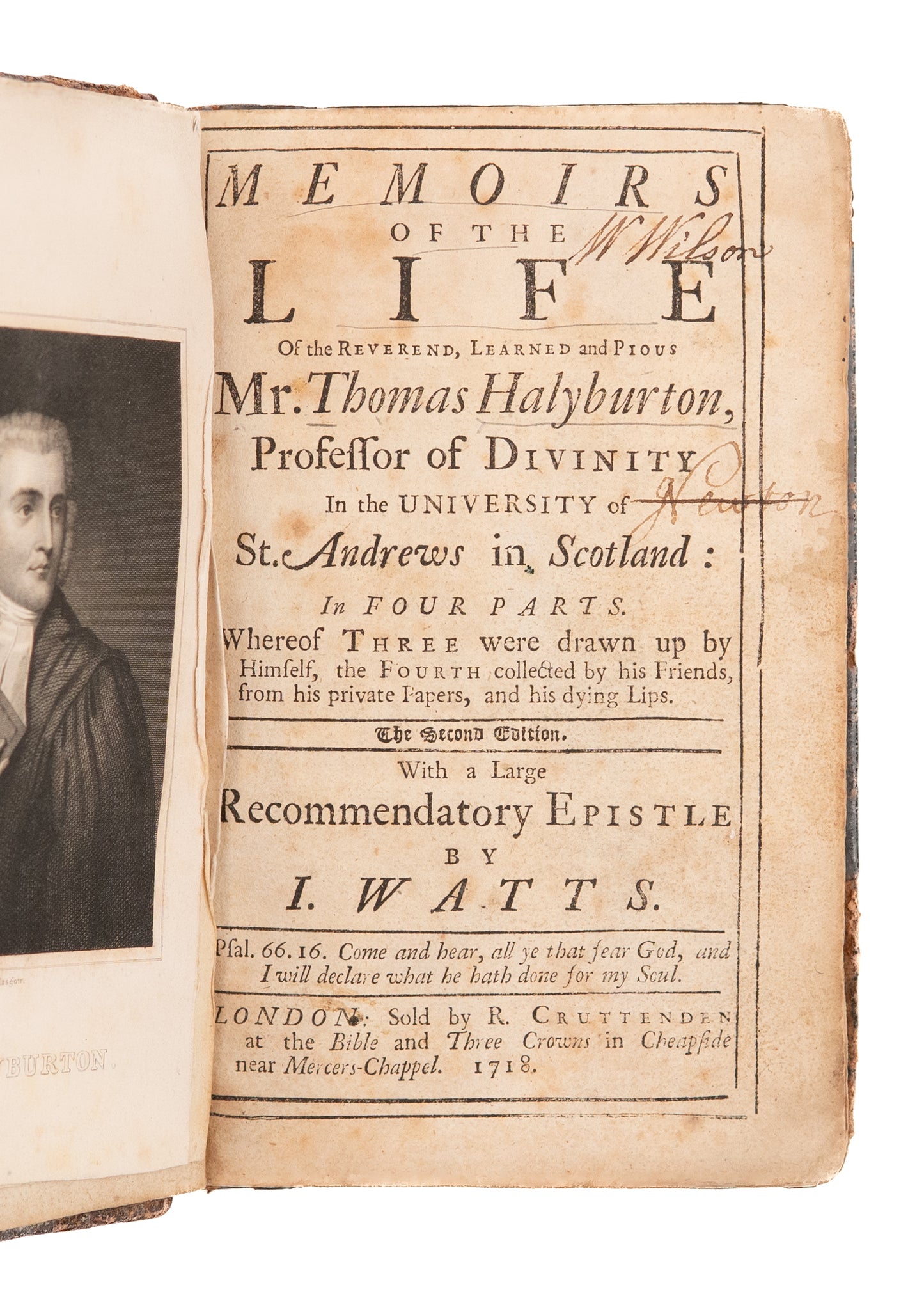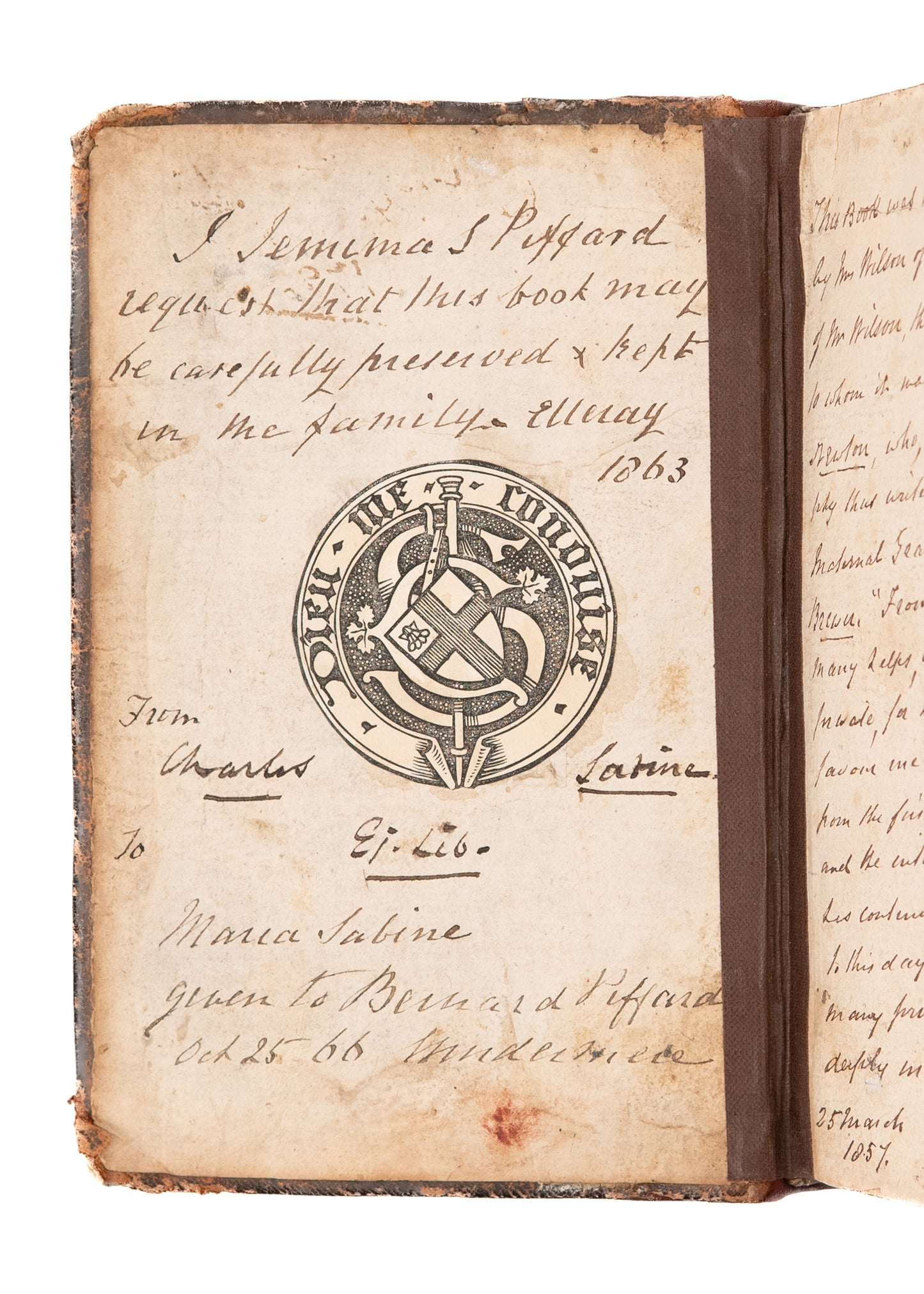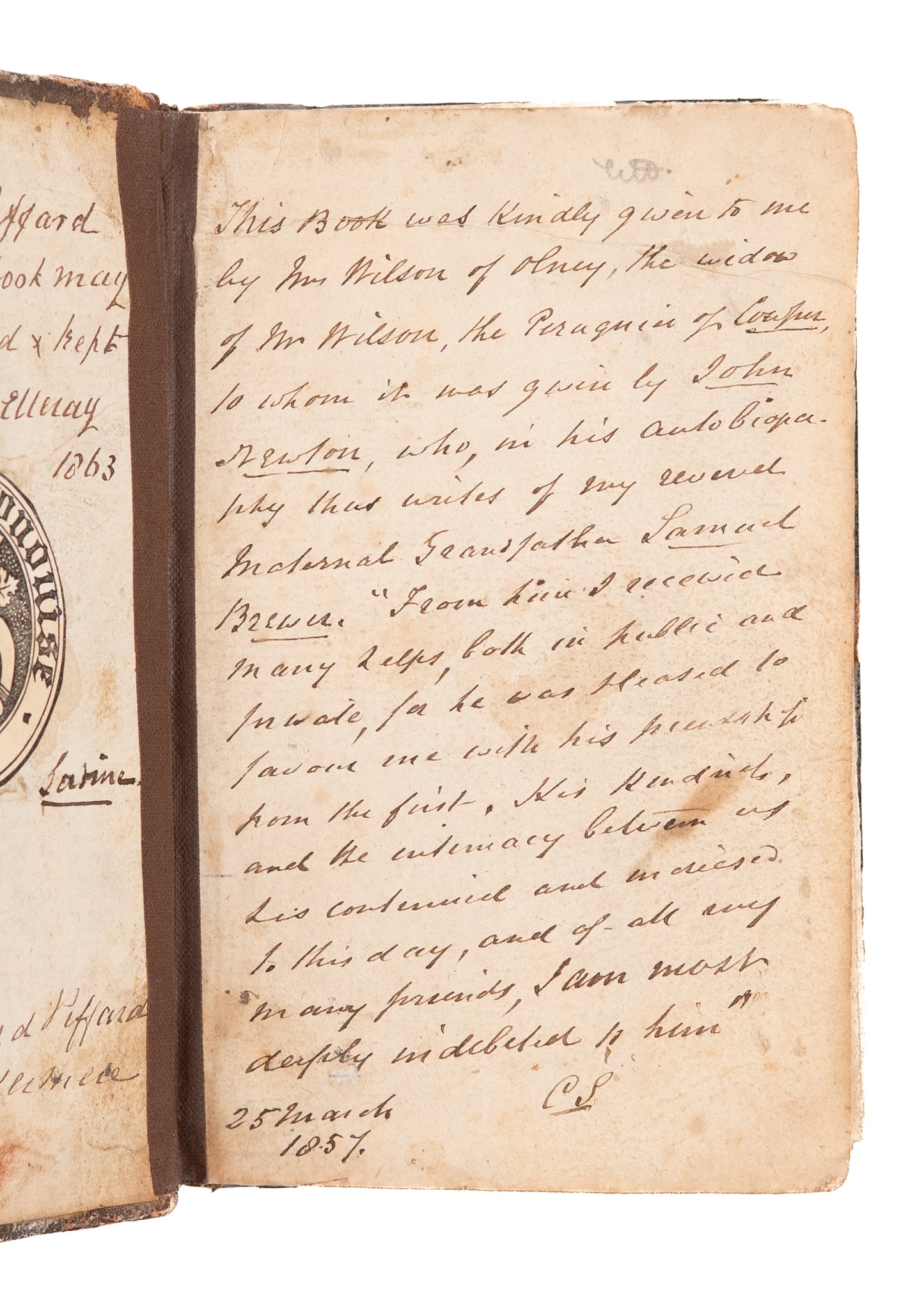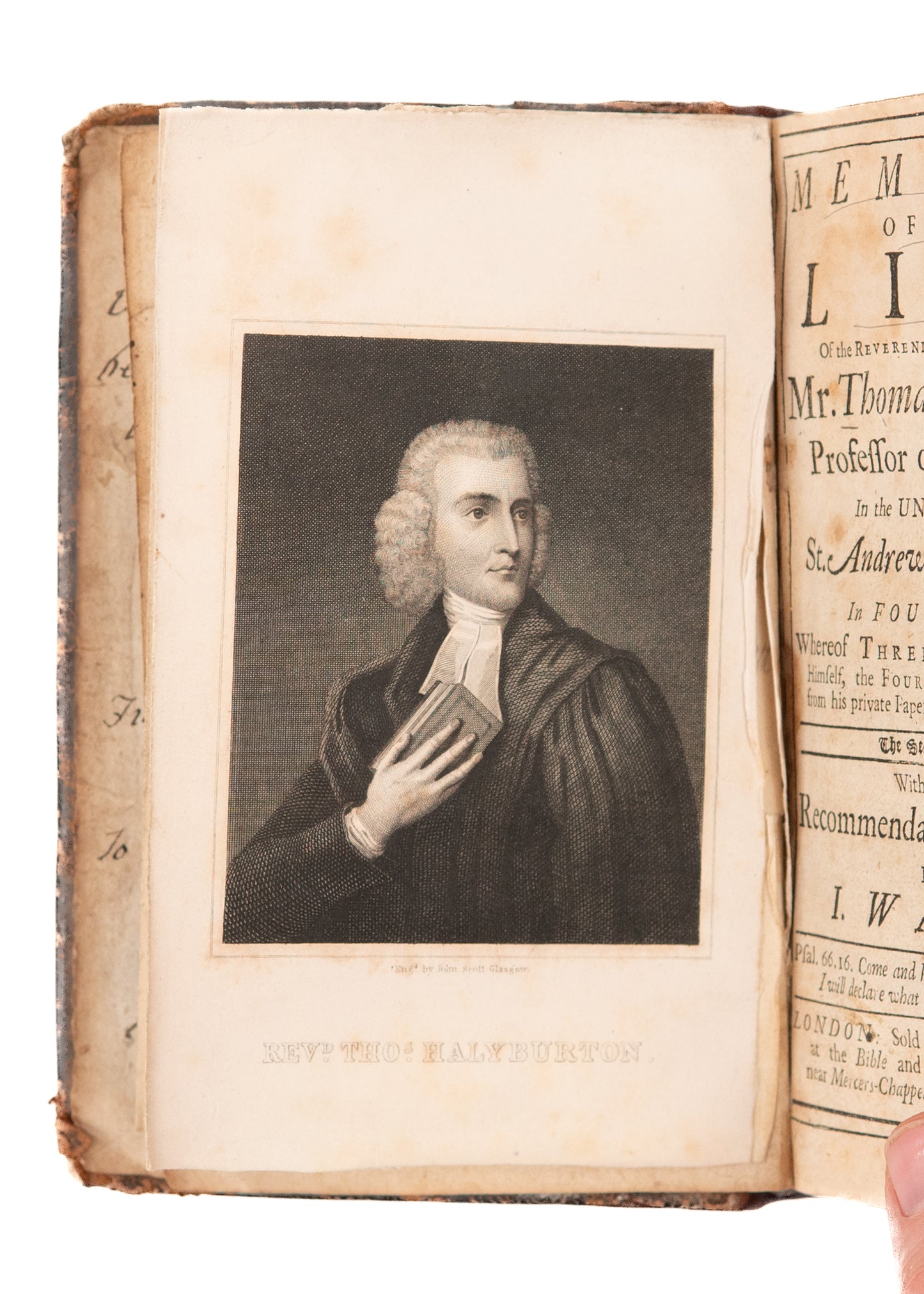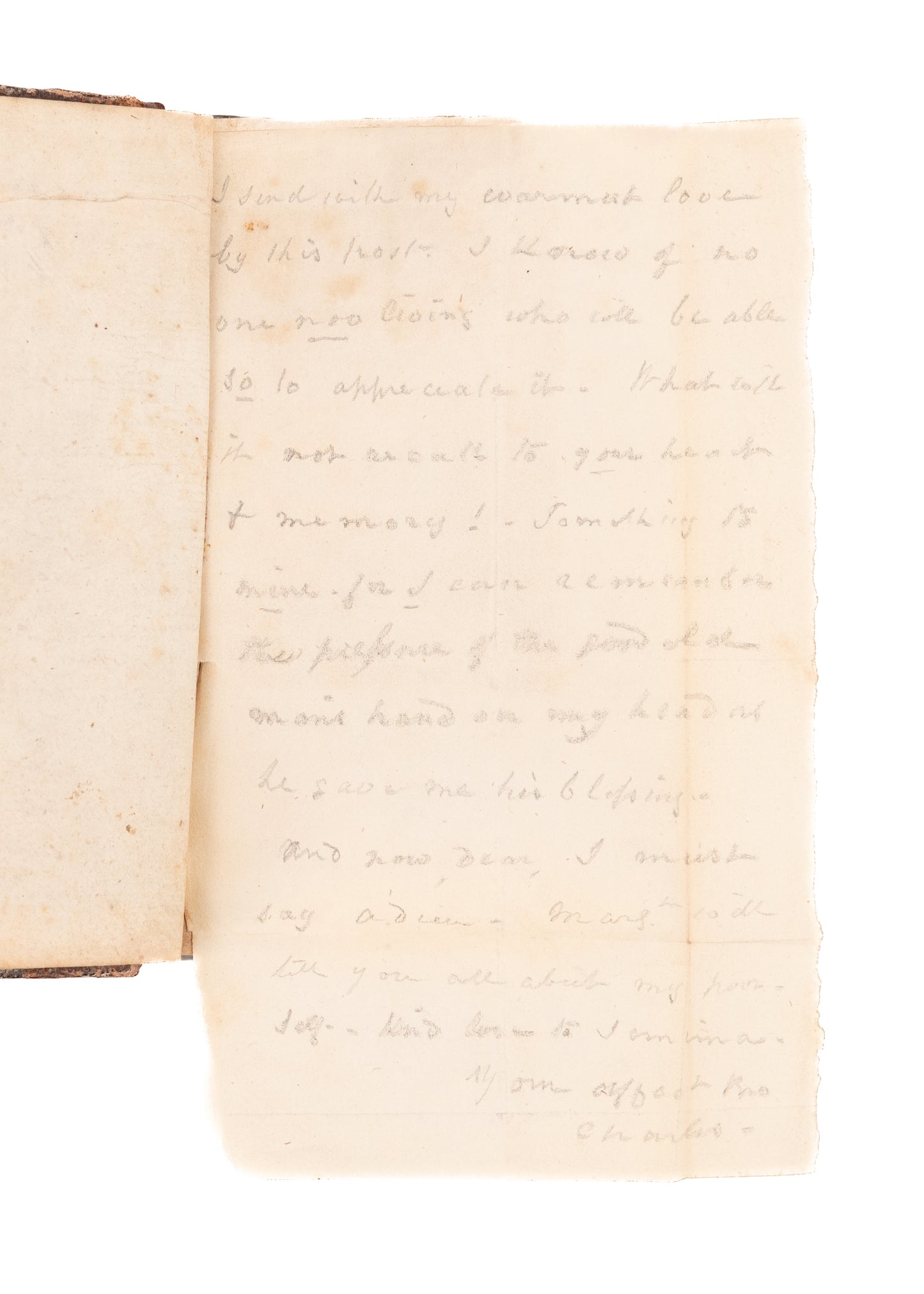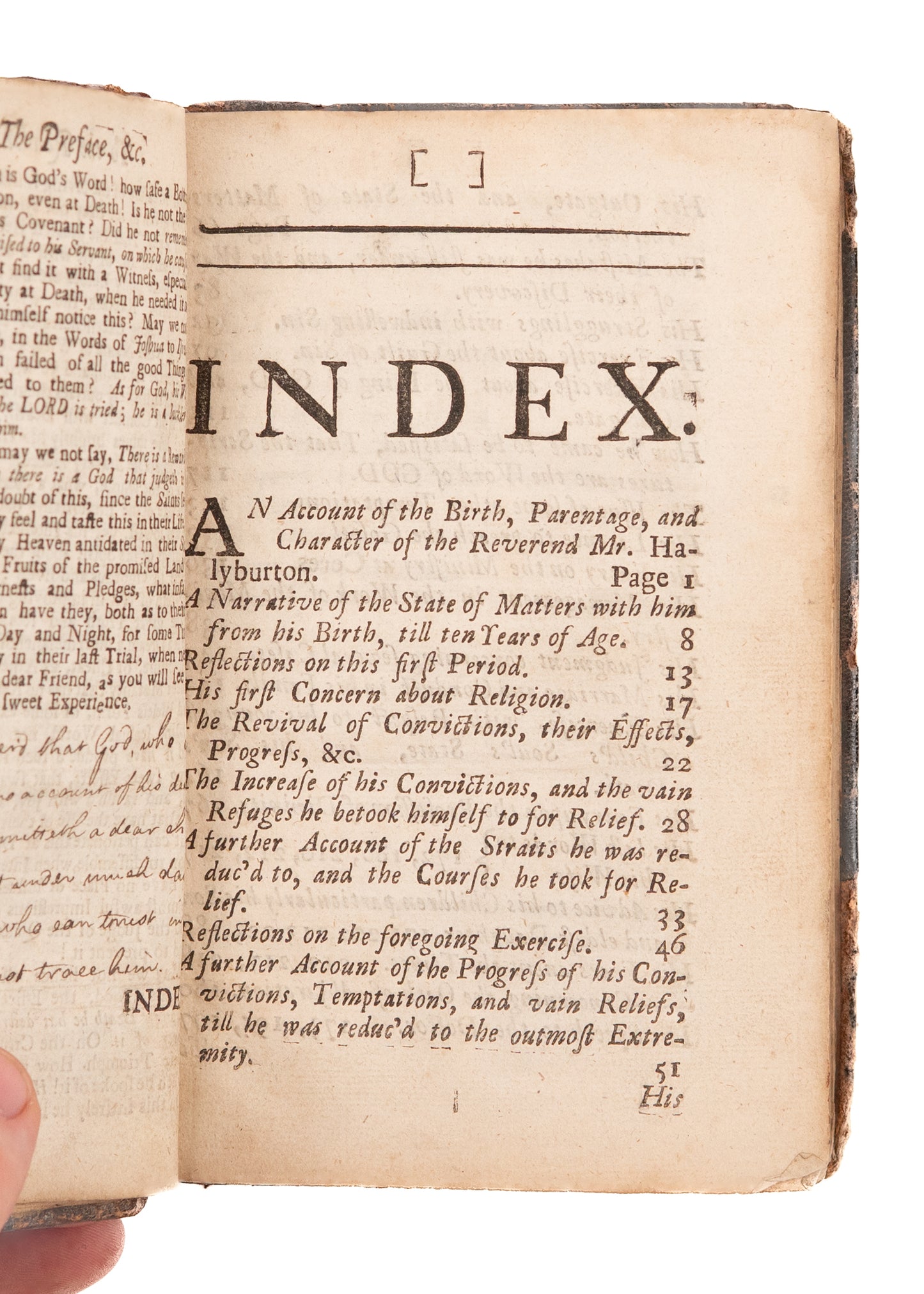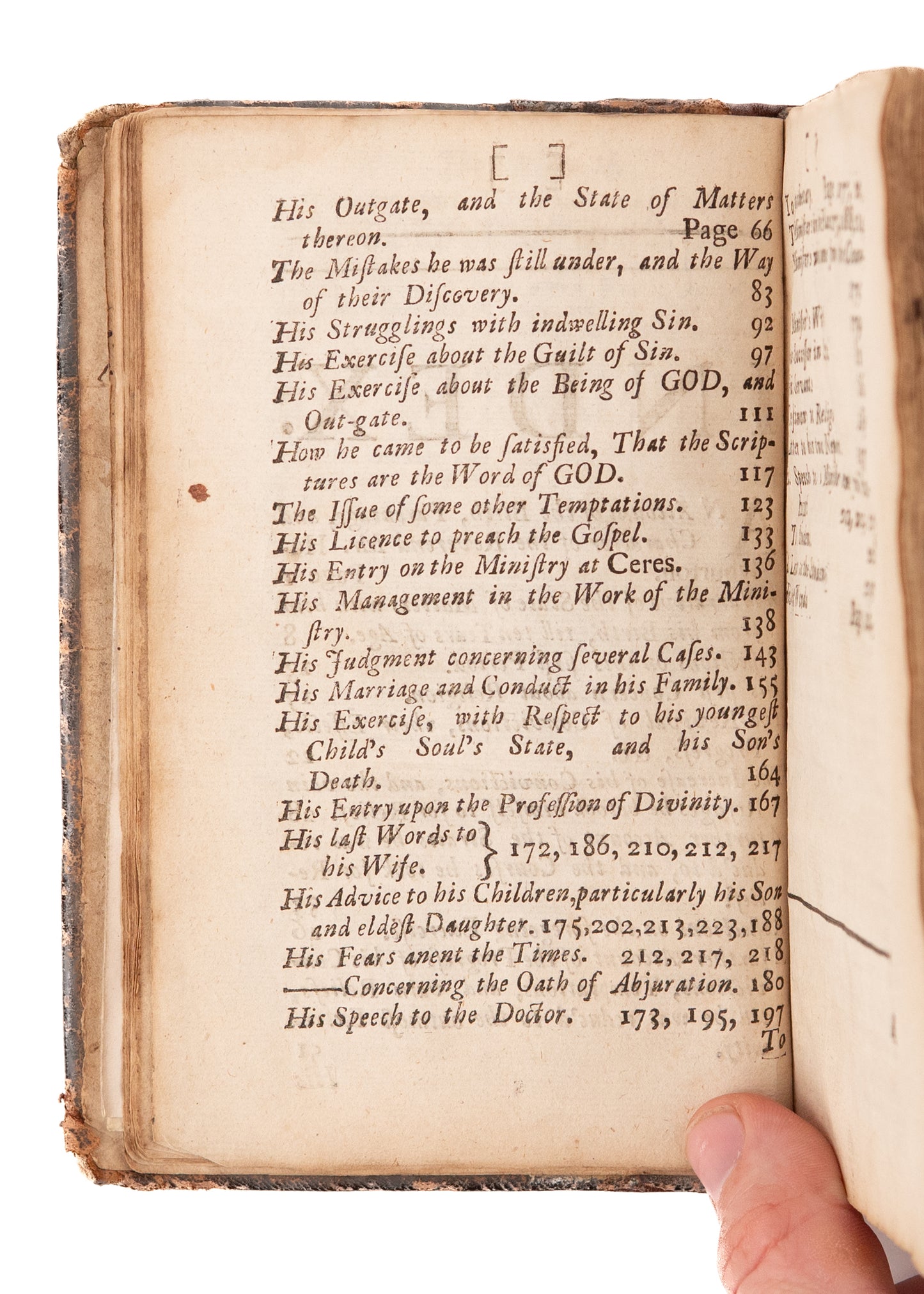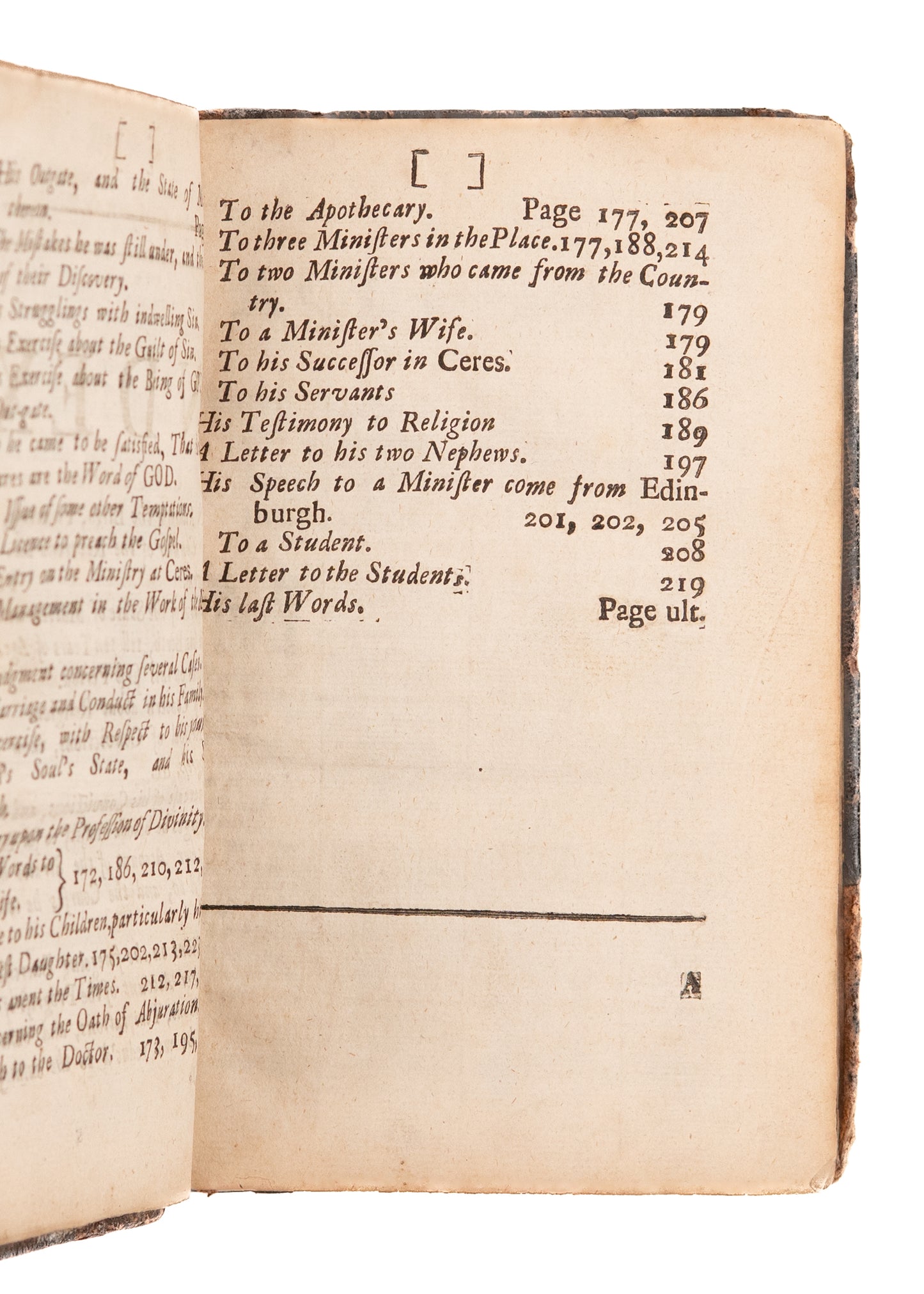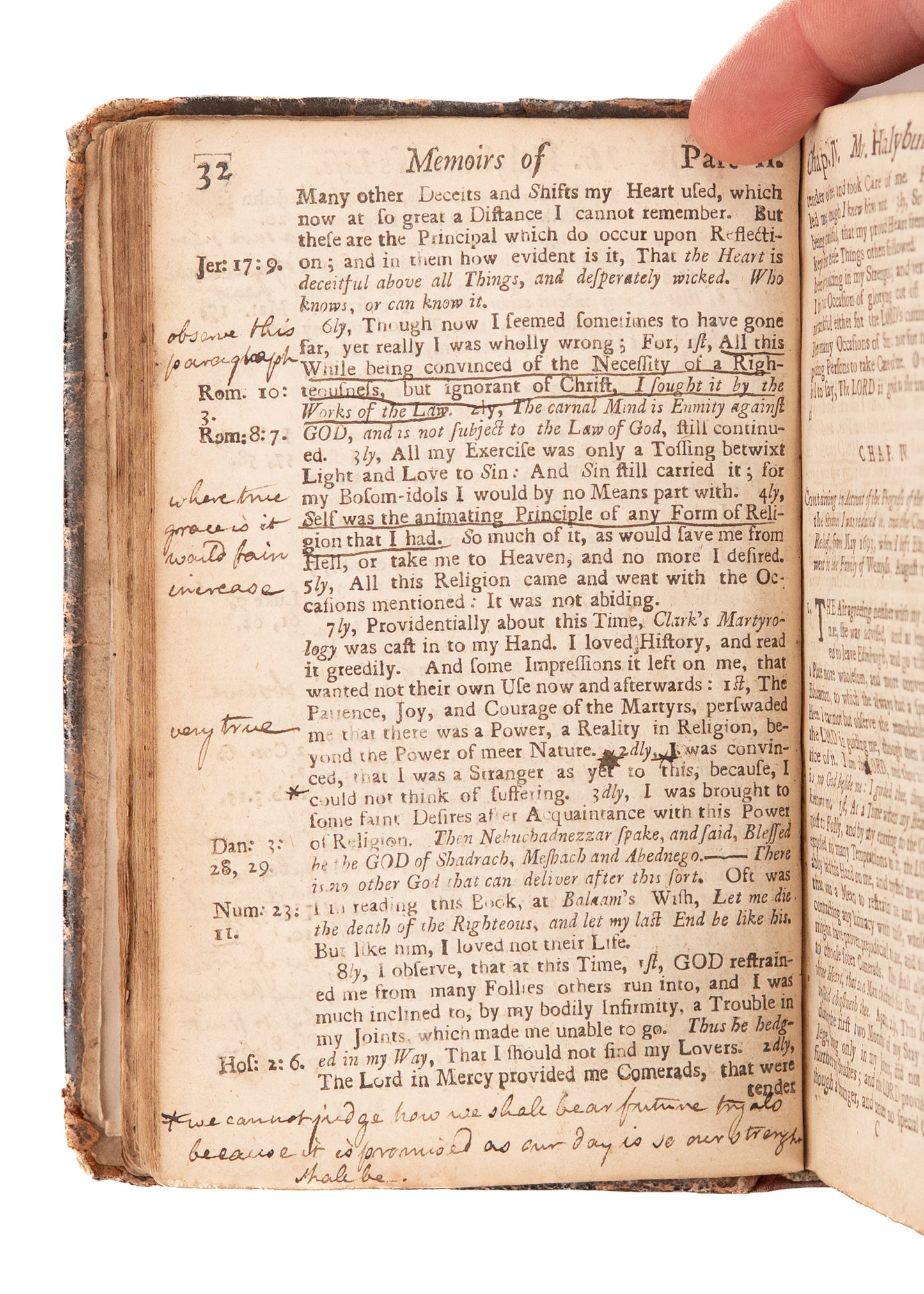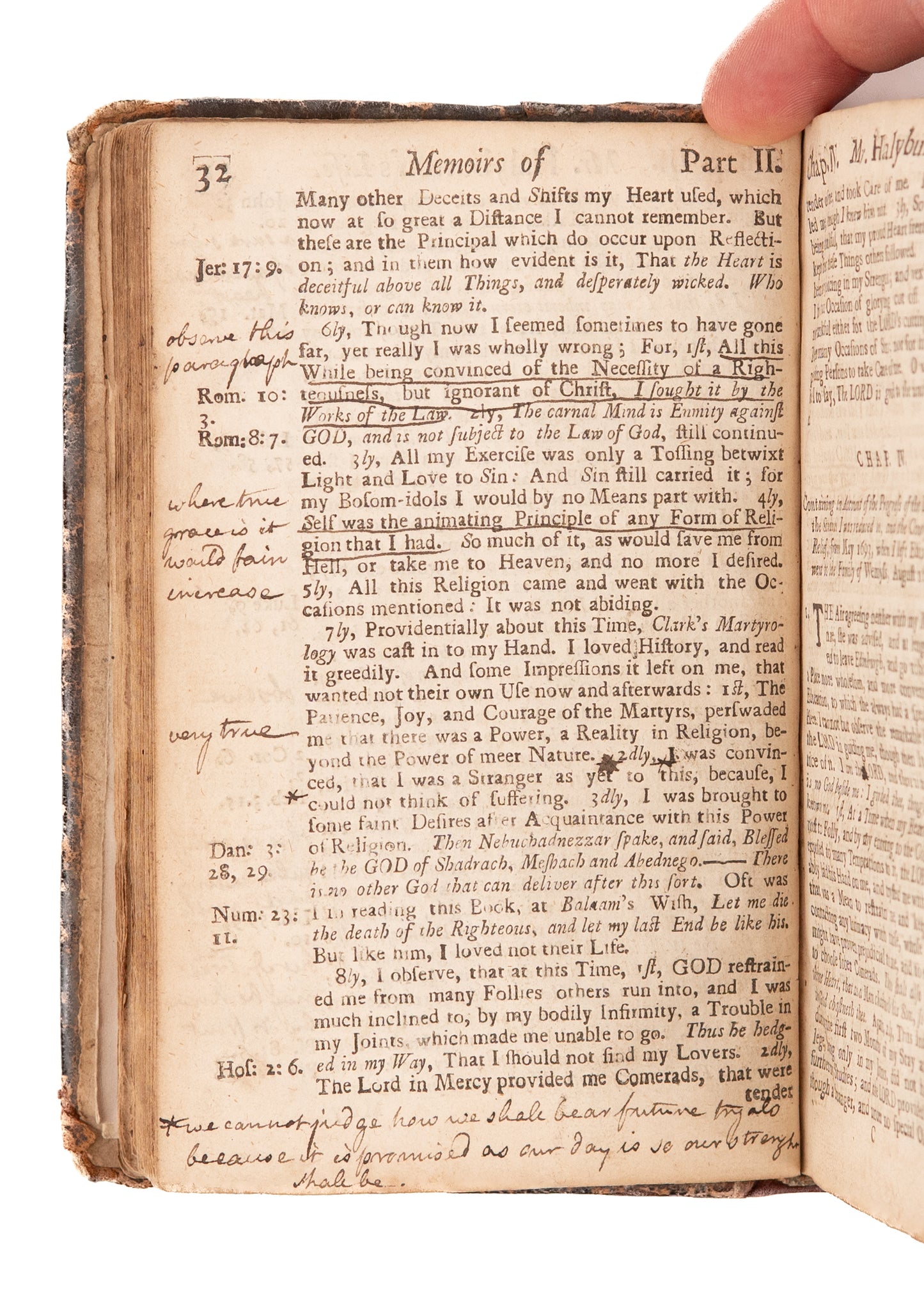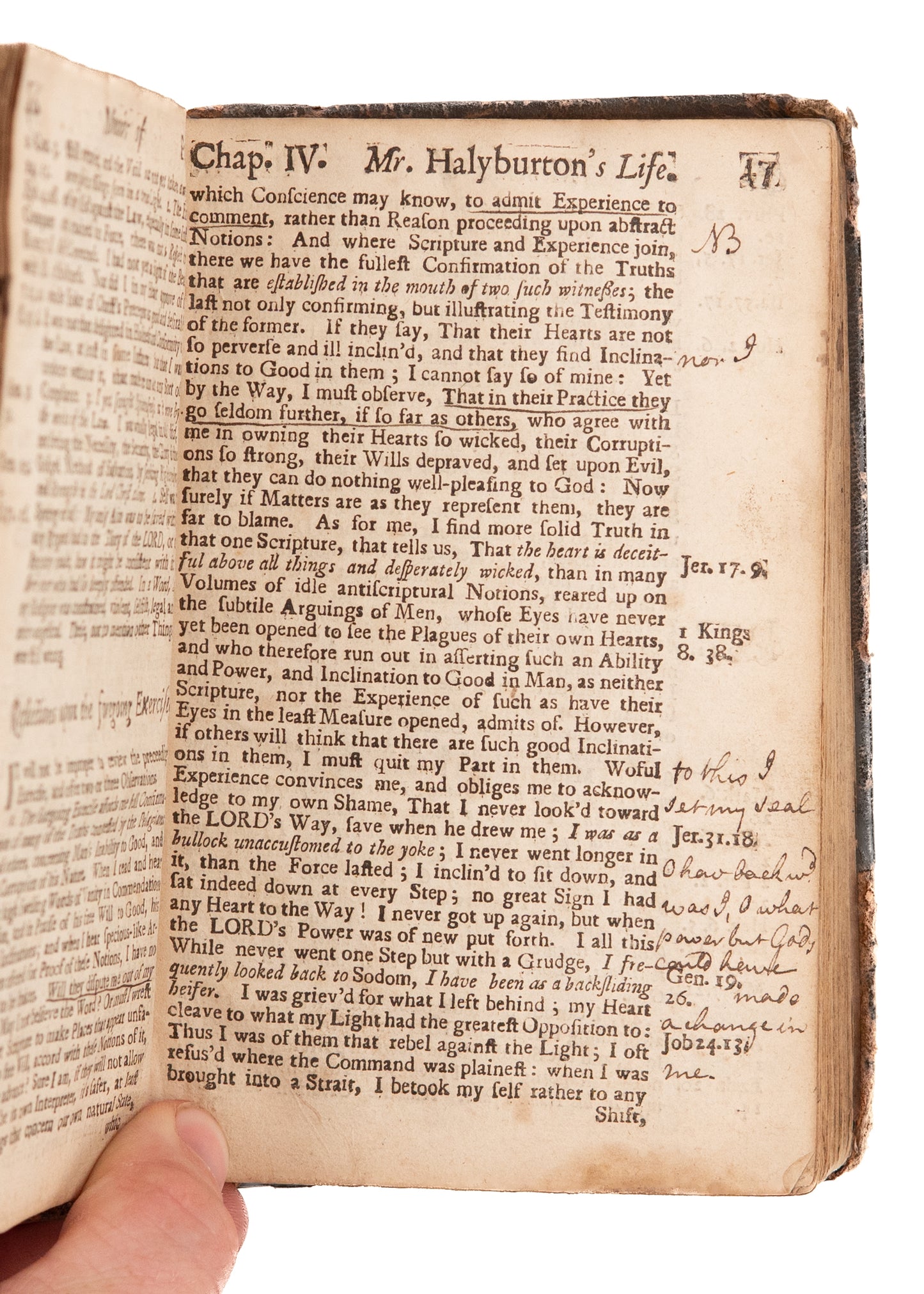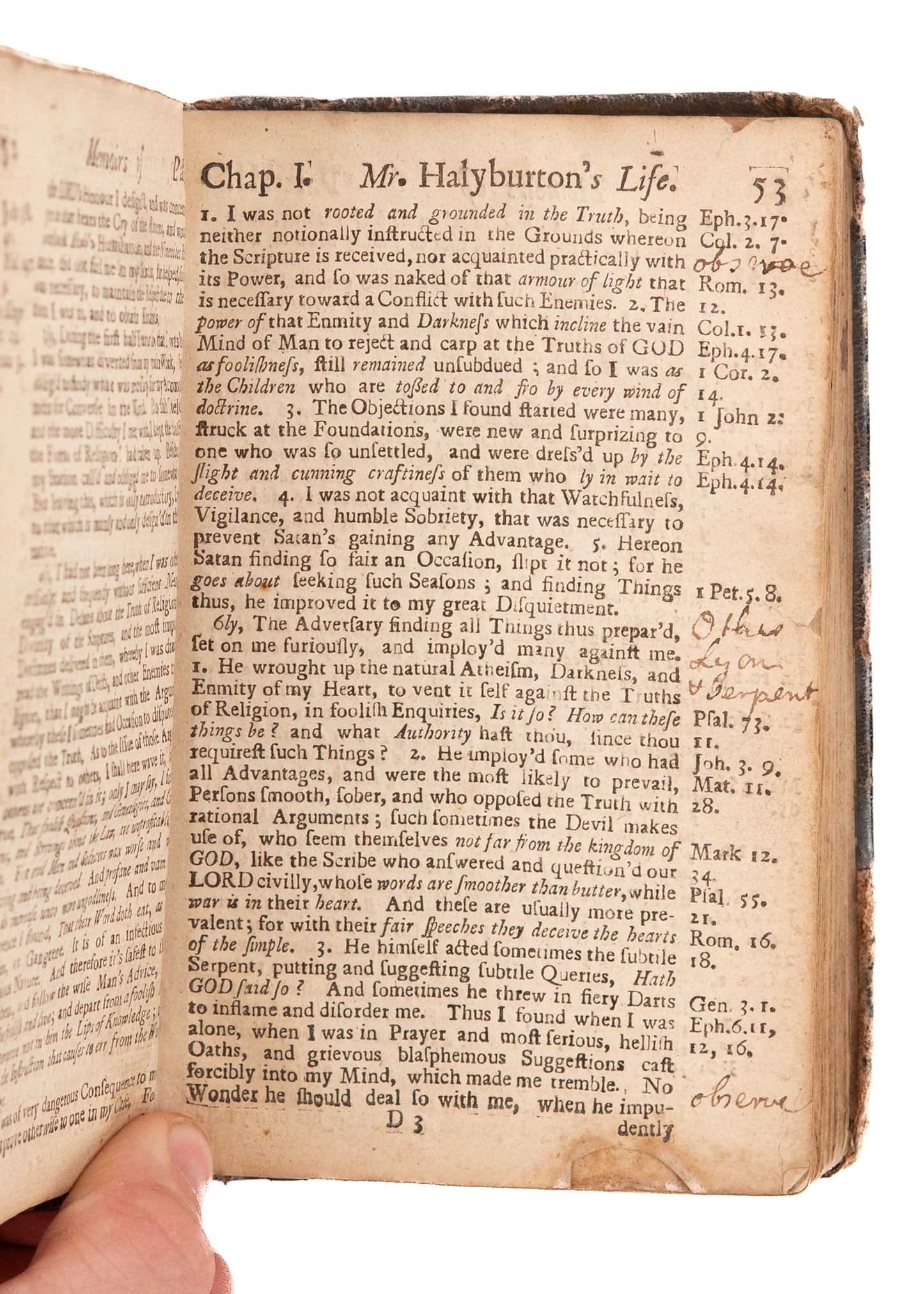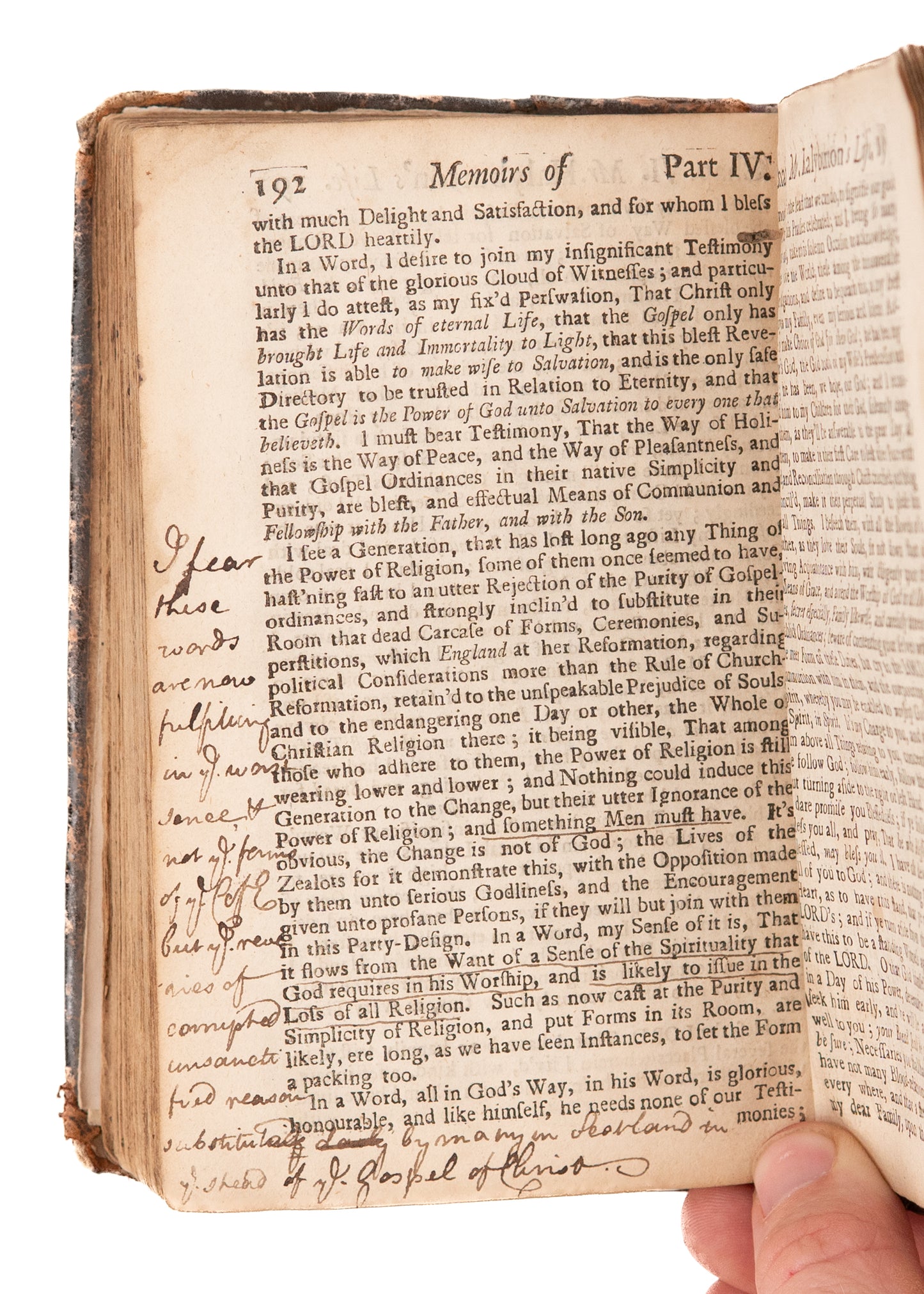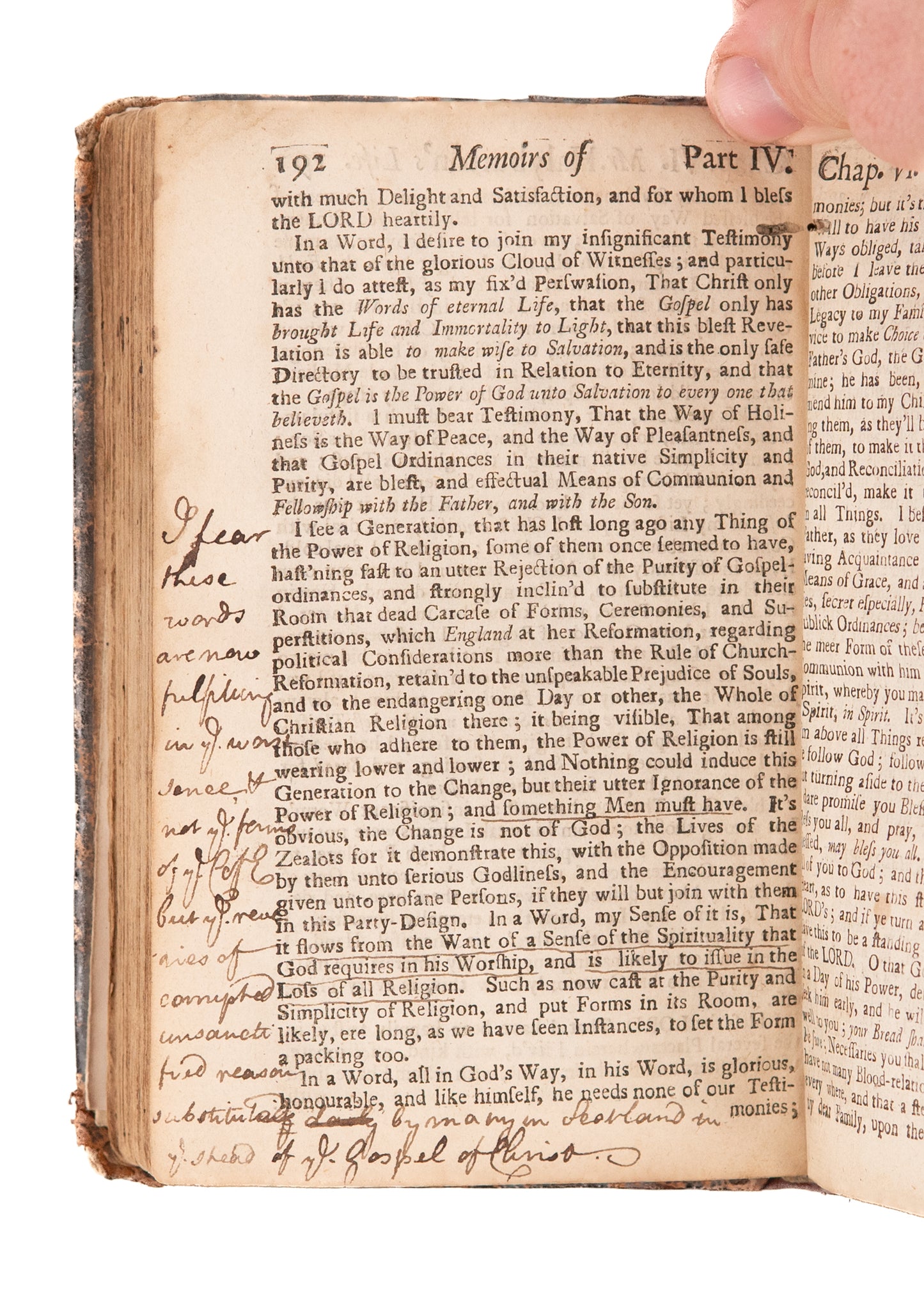Specs Fine Books
1718 JOHN NEWTON. His Annotated Copy of Halyburton's Memoir "What power but God's could change me!"
1718 JOHN NEWTON. His Annotated Copy of Halyburton's Memoir "What power but God's could change me!"
Couldn't load pickup availability
A wonderfully provenanced artifact that lived its early days deeply embedded in the spiritual life of former slave-trader turned pastor, hymnist, theologian, and unlikely abolitionist, John Newton [1725-1807].
The Provenance.
Not only is the work desirable because it was Newton’s own, but the connection between Newton and the book’s later owners is of interest as well.
Originally Newton’s personal copy, he later gifted it to Mr. and Mrs. William Wilson, likely after 1800 when his growing blindness rendered his books all but useless. The Wilsons were friends of Newton’s, earnest Christians, and the financial patrons of, and he the wig-maker to, fellow Olney hymnist, William Cowper. It was then gifted, in advanced age, by Mrs. Wilson to Charles Sabine in remembrance of Sabine’s maternal grandfather, and Newton’s own pastor and mentor, Samuel Brewer.
Samuel Brewer was minister at near-by Stepney. After Newton’s initial conversion, Newton did plan to sail again aboard a slave ship. Still note quite an abolitionist, he had requested an assignment other than jailer, which he felt to be too cruel for his newly tender conscience. Just before the ship sailed, he had a sort of breakdown and could not go.
He remained home and instead spent time with Rev. Samuel Brewer. The two became close immediately and Brewer provided a letter of introduction to George Whitefield, then preaching at the Moorfields. Newton went to hear him; his initial conversion, authentic to be sure, was now absolutely ablaze and consuming. One would be tempted to use “second work” language from the way it is described by early biographers, i.e. “he was a man on fire.”
From those early days forward, Brewer was Newton’s confidant and friend, Newton’s life-long pastor and mentor.
The Text.
Halyburton’s Memoir and his other theological writings were influential to Newton’s work as a memoirist, as a theologian, and in his pastoral-epistolary work.
The Memoir itself likely shaped some of his feelings about the value of publishing autobiographical material that was deeply personal and spiritually experimental. It is not accidental that when one sees compilations of the great spiritual memoirs of the era, Newton and Halyburton are often named in the same breath [see The Christian Baptist, 1826. p.163; the RTS’ Christian Biography tracts, c.1850; Cricton’s Converts from Infidelity; The Jubilee Memorial of the RTS, 1850. p.293, etc.]. They have a shared DNA.
In a letter to a friend in spiritual distress, dated July 14, 1775, Newton refers to another work by Haylburton, i.e. Natural Religion Insufficient. His correspondent is deeply concerned about the nature of authentic conversion and saving faith, which occupies the latter portion of the volume. Newton writes, “In addition to a long letter, I send you a great book. A part of it (for I do not ask you to read the whole) may perhaps explain my meaning better than I have leisure to do myself. I set high value on this book of Mr. Halyburton’s; so that, unless I could replace it with another, I know not if I would part with it for its weight in gold.”
He also deeply valued Halyburton’s A Modest Enquiry whether Regeneration or Justification has the Precedency in the Order of Nature [1714] [Hindmarsh, 151]. Newton found him particularly helpful in thinking through the supralapsarian and sublapsarian lines of thought.
Halyburton, Thomas. Memoirs of the Life of the Reverend, Learned, and Pious Mr. Thomas Halyburton, Professor of Divinity in the University of St. Andrews in Scotland: In Four Parts. Whereof Three Parts were drawn up by Himself, the Fourth collected by his friends from his private Papers, and his dying Lips. The Second Edition. With a Large Recommendatory Epistle by I[saac] Watts. London. Sold by R. Cruttenden at the Bible and Three Crowns in Cheapside near Mercers-Chappel. 1718. 228pp.
The provenance and manuscript remains of John Newton are as follows:
The pastedown contains the following: “I Jemima S[abine] Piffard request that this book may be carefully preserved & kept in the family. Elleray. 1863.” This followed by the circular woodcut bookplate of Charles Sabine, Jemima’s father, then “From Charles Sabine Ex Lib. To Maria Sabine. Given to Bernard Piffard. October 25 [18]66. Windermere.”
Then the ffep contains a lengthy inscription by Charles Sabine, “This book was kindly given to me by Mrs. Wilson of Olney, the widow of Mr. Wilson, the Peraquin of Cowper, to whom it was given by John Newton, who, in his autobiography thus writes of my revered Maternal Grandfather Samuel Brewer. “From him I received many helps, both in public and private, for he was pleased to favor me with his friendship from the first. His kindness and the intimacy between us has continued and increased to this day, and of all my many friends, I am most deeply indebted to him. CS. 25 March 1857.”
After the ffep, there is tipped in a letter by Charles Sabine to his sister, Maria Sabine. After some sweet introductories, he writes, “. . . I often think of you in connection with a little book I send with my warmest love by this post. I know of no one now living who will be able so to appreciate it. What will it not recall to your heart & memory! . . . for I can remember the presence of the good old man’s hand on my head as he gave me his blessing.”
This is followed by a 19th century tipped in engraving of Halyburton.
The title then bears the signatures of both W. Wilson [its original recipient from Newton] and that of Newton with his typical conjoined JNewton.
There are a rather large number of marginal notations of both a personal and of a theological nature, generally gathered toward the first 50 pages, though with the occasional throughout. These appear to be from at least two separate readings of the work by Newton, with one group being more autobiographical, penned in a closer dark sepia ink; and a smaller number of lighter sepia notes that are more theological.
We know from Newton’s autobiography that he purchased the work in January of 1755. He had been a Christian for just less than 7 years at this point and was still subject to doubts. To this period belong the largest quantity of the notes. They are darker and in the closer hand we see in his writings of this period. These are strongly autobiographical and provide insight into Newton’s view of the work of conversion in his own life.
The lighter sepia notes are likely from a later reading and focus more on theological than experimental themes, commenting on the rationalism in the Scottish church, etc., which he was conversing about with regard to Halyburton in correspondence dating to 1775.
There is also a group of pencil marginalia with almost no text. These seem also to be his, but the lack of actual text makes identification all but impossible.
Examples:
Let us remember that God, who is only wise, & giveth no account of his dealings sometimes permitteth a dear child, a true servant, to depart under much distress: blessed are they who can trust in him, when they cannot trace him. [Note at end of preface]
This is a great tryal to a Christian, but its being so is a comfortable evidence of a spiritual mind. [p.4 on the tendency to morbid self-reflectionin those newly converted]
Blessed be God for ye peace I have found in this rule, let men, let devils object. I cannot, I dare not put any feeble hand to ye ark, but refer the cause to the great day. [p.15 on the inscrutability of God’s ways]
NB a lively picture of ye man who would fain serve those contrary masters, God & the world. [p.24]
This is the great danger [p.25 next to the phrase “I thought to find peace in a more careful attendance upon duties.”]
Conviction is not always conversion [p.29]
This is a difficulty many meet with, but ye tree may be known by its fruit [p.31 on assessing genuine conversion]
A sure sign of a carnal heart [p.31 regarding the passage “I carefully sought out the least degrees of Grace that might be saving.”]
To this I set my seal. O how backward was I, o what power but God’s could have made a change in me [p.47 after the passage, “Woful experience convinces me, and obliges me to acknowledge to my own shame, that I never look’d toward the Lord’s way, save when he drew me . . . when the Lord’s power was of new put forth.”]
A useful note for a doubting, fearful believer [p.74]
I fear these words are no fulfilling in ye worst sense & not ***** of ye C of E, but *** reveries of corrupted unsanctified reason substituted by many I Scotland in ye stead of ye Gospel of Christ [p.192]
Etc.
This book is referred to by Newton in his autobiography under the entry for Saturday, January 25th, 1755: "Purchased the lives of two noted servants of God deceased (Joseph Allen and T Halyburton). Lord grant I may be profited by their experience, and animated by their example.” It is also recorded as has having been a part of Newton’s library in Hindmarsh, p.333
Original full calf boards with competent full calf respine. Occasional tears and stains. Solid and textually complete.
Share
